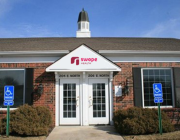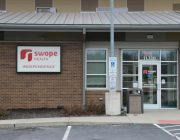Swope Health announces a new edition of its podcast, One on One with Swope Health, featuring Melesa Johnson, Deputy Chief of Staff in the Office of Mayor Quinton Lucas. Johnson also serves as the Mayor’s director of public safety.
Eric Wesson, managing editor and publisher of The Call, hosts the show’s conversations with Kansas Citians about issues of importance to the community’s health and wellbeing. In this conversation, Wesson and Johnson address violent crime as a public health crisis.
Johnson is a native of Kansas City, and was a student of the Hickman Mills School District, then at Bishop Miege High School, before attending Columbia University in New York City.
Johnson, a lawyer, has worked in the law offices of Seyferth Blumenthal & Harris LLC and Baker Sterchi Cowden & Rice, and was a federal judicial clerk in the chamber of the U.S. Magistrate Judge Willie Epps Jr. She also was an assistant prosecutor in the Jackson County Prosecutor’s Office.
She received her law degree from the University of Missouri-Columbia School of Law. She also has a bachelor’s degree in political science, African-American studies and music history from Columbia University.
Working in crime prevention is challenging, she notes, adding that she genuinely believes there can be positive change. It will require collaboration across the leadership of the city, the police department and the prosecutor’s office, using evidence-based strategies. Johnson said she appreciates the openness of Chief Stacey Graves and her willingness to engage with the community and neighborhoods, as well as the prosecutor’s office and the city. “A welcome change,” she said.
Johnson notes the clearance rates for criminal case files have been improving, based on the improving relationships between the police and prosecutors.
Johnson focuses on collaboration in her role leading Partners for Peace, a program to reach family members touched by violent crime and provide support, with a goal of preventing further crime. The initiative requires collaboration of the city, the prosecutor’s office and more than a dozen community social service providers. She also notes the impact of KC 360, a crime prevention program modeled on a similar program in Omaha, also driven by collaboration between the community, police, justice systems and social service agencies.
She describes new steps in addressing violence prevention, including one starting with prisoners before release from Department of Corrections, to help build a foundation of support for their re-entry. A second initiative works with the Gang Intelligence Unit, identify those close to the crimes, and providing support for ways to change their lives.
She is an enthusiastic supporter of the city’s $30 million funding for crime prevention, which she calls an historic piece of legislation. She explains mechanisms in place to drive a different result with this funding, including the involvement of Dr. Marvia Jones of the Health Department, and social service agencies, both new and established.
The conversation probes the benefits and challenges of solutions like conflict resolution, in context of broader societal issues of root causes of crime, including poverty, racism and inequality. Johnson raises large cultural questions: How do we start conversations about the cultural and value norms that need to change in our own houses?
Listen to the full conversation:
YouTube: https://youtu.be/KpYAujuLXdE
Spotify: https://podcasters.spotify.com/pod/show/swopehealth/episodes/One-on-One-with-Swope-Health-Melesa-Johnson-e22cd4r















